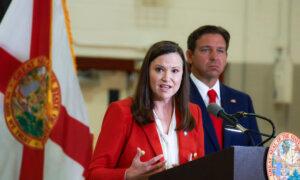Rubio has said that the CCP is his top focus, which he defined as ’the most potent and dangerous, near-peer adversary this nation has ever confronted.’
The Senate unanimously approved the nomination of Sen. Marco Rubio (R-Fla.) as secretary of state on Jan. 20, making him the first of President Donald Trump’s Cabinet picks to receive the green light on Inauguration Day.
Sen. Jim Risch (R-Idaho), chairman of the committee, said he encourages anyone who wants a clear understanding of U.S. foreign policy to watch Rubio’s testimony.
“His performance was flawless,” he told the lawmakers in a floor speech ahead of the Monday vote.
The committee’s vice chair, Jeanne Shaheen (D-N.H.), echoed him, saying she was pleased that the committee had moved swiftly and unanimously to move Rubio’s confirmation forward.
Rubio, 53, has likely faced the easiest confirmation process out of Trump’s Cabinet choices. Many senators have worked with Rubio on policy issues, a relationship in which he built bipartisan support.
The three-term Florida senator faced a warm audience during his Jan. 15 hearing. A number of Senate Democrats voiced strong support for his confirmation to represent the United States overseas. The top two senators on the panel, Risch and Shaheen, agreed in an opening statement about Rubio’s skills to take on the job.
Sen. Tammy Duckworth (D-Ill.) thanked Rubio in the hearing for helping amend Senate floor rules so that she could bring her newborn daughter to the floor to vote, noting that it was “a moment of true bipartisanship.”
Rubio told the committee that he intends to make the State Department “relevant again.” The department over successive administrations has become marginalized because “it takes so long for the State Department to take action,” he said.
The core mission he envisions for the agency is about “placing the interest of America and Americans above all else” and to “promote peace abroad and security and prosperity here at home.”
Top on his focus is confronting the Chinese Communist Party, which he defined as “the most potent and dangerous, near-peer adversary this nation has ever confronted.”
China dominates critical mineral supplies essential in industries such as electronics, energy, and defense. In Washington, there is bipartisan concern over the regime’s military aggression toward its neighbors, covert influence operations, and human rights suppression that has sometimes reached into the United States.
“If we stay on the road we’re on now, in less than 10 years, virtually everything that matters to us in life will depend on whether China will allow us to have it or not,” Rubio said.
He is set to meet on Jan. 21 with his counterparts from the Quad grouping, the foreign ministers of India, Japan, and Australia, officials have said.
The Senate Armed Services Committee approved Pete Hegseth as the secretary of defense with a tight 14–13 margin. A full vote on his nomination is expected later this week.
The Senate Intelligence Committee voted 14–3 to approve the nomination of John Ratcliffe as CIA director.
The Associated Press contributed to this report.
Original News Source Link – Epoch Times
Running For Office? Conservative Campaign Consulting – Election Day Strategies!


